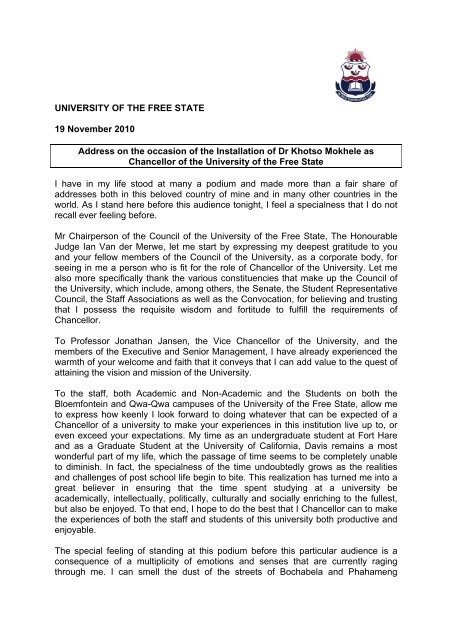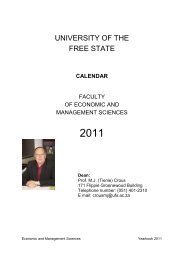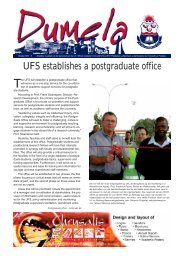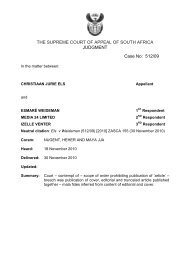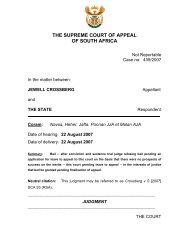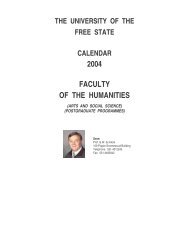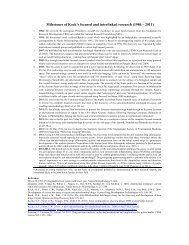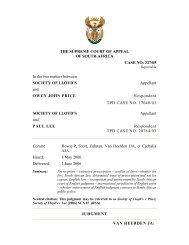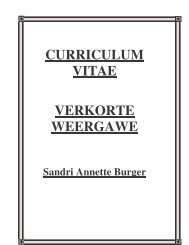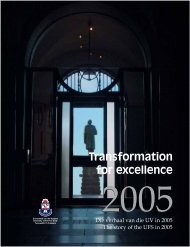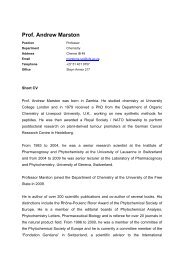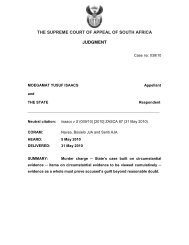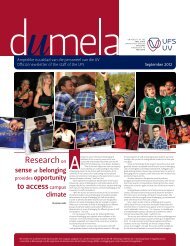UNIVERSITY OF THE FREE STATE 19 November 2010 Address on ...
UNIVERSITY OF THE FREE STATE 19 November 2010 Address on ...
UNIVERSITY OF THE FREE STATE 19 November 2010 Address on ...
- No tags were found...
Create successful ePaper yourself
Turn your PDF publications into a flip-book with our unique Google optimized e-Paper software.
<str<strong>on</strong>g>UNIVERSITY</str<strong>on</strong>g> <str<strong>on</strong>g>OF</str<strong>on</strong>g> <str<strong>on</strong>g>THE</str<strong>on</strong>g> <str<strong>on</strong>g>FREE</str<strong>on</strong>g> <str<strong>on</strong>g>STATE</str<strong>on</strong>g><str<strong>on</strong>g>19</str<strong>on</strong>g> <str<strong>on</strong>g>November</str<strong>on</strong>g> <str<strong>on</strong>g>2010</str<strong>on</strong>g><str<strong>on</strong>g>Address</str<strong>on</strong>g> <strong>on</strong> the occasi<strong>on</strong> of the Installati<strong>on</strong> of Dr Khotso Mokhele asChancellor of the University of the Free StateI have in my life stood at many a podium and made more than a fair share ofaddresses both in this beloved country of mine and in many other countries in theworld. As I stand here before this audience t<strong>on</strong>ight, I feel a specialness that I do notrecall ever feeling before.Mr Chairpers<strong>on</strong> of the Council of the University of the Free State, The H<strong>on</strong>ourableJudge Ian Van der Merwe, let me start by expressing my deepest gratitude to youand your fellow members of the Council of the University, as a corporate body, forseeing in me a pers<strong>on</strong> who is fit for the role of Chancellor of the University. Let mealso more specifically thank the various c<strong>on</strong>stituencies that make up the Council ofthe University, which include, am<strong>on</strong>g others, the Senate, the Student RepresentativeCouncil, the Staff Associati<strong>on</strong>s as well as the C<strong>on</strong>vocati<strong>on</strong>, for believing and trustingthat I possess the requisite wisdom and fortitude to fulfill the requirements ofChancellor.To Professor J<strong>on</strong>athan Jansen, the Vice Chancellor of the University, and themembers of the Executive and Senior Management, I have already experienced thewarmth of your welcome and faith that it c<strong>on</strong>veys that I can add value to the quest ofattaining the visi<strong>on</strong> and missi<strong>on</strong> of the University.To the staff, both Academic and N<strong>on</strong>-Academic and the Students <strong>on</strong> both theBloemf<strong>on</strong>tein and Qwa-Qwa campuses of the University of the Free State, allow meto express how keenly I look forward to doing whatever that can be expected of aChancellor of a university to make your experiences in this instituti<strong>on</strong> live up to, oreven exceed your expectati<strong>on</strong>s. My time as an undergraduate student at Fort Hareand as a Graduate Student at the University of California, Davis remains a mostw<strong>on</strong>derful part of my life, which the passage of time seems to be completely unableto diminish. In fact, the specialness of the time undoubtedly grows as the realitiesand challenges of post school life begin to bite. This realizati<strong>on</strong> has turned me into agreat believer in ensuring that the time spent studying at a university beacademically, intellectually, politically, culturally and socially enriching to the fullest,but also be enjoyed. To that end, I hope to do the best that I Chancellor can to makethe experiences of both the staff and students of this university both productive andenjoyable.The special feeling of standing at this podium before this particular audience is ac<strong>on</strong>sequence of a multiplicity of emoti<strong>on</strong>s and senses that are currently ragingthrough me. I can smell the dust of the streets of Bochabela and Phahameng
Locati<strong>on</strong>s where I was born and grew up. I can hear the thunderous summer rainstorms <strong>on</strong> the corrugated ir<strong>on</strong> roofing without the ceiling that inevitably dampens thesnooze inducing sounds. I can smell the freshness of cut grass at the Bloemf<strong>on</strong>teinGolf Course where I caddied from the very tender age of 10 years until I went toMoroka High School in Thaba Nchu for matric. I can hear with much greater claritythe voices of Mohlouoa and Ntlabolane Mokhele, my paternal grandparents, andMatshediso and Paulina Leb<strong>on</strong>a, my maternal grandparents from whence they areresting not far from where we are assembled here this evening. Even closer andlouder are the voices of Kenosi and Moip<strong>on</strong>i Mokhele, my parents, dispensingworldly and wise counsel. I can smell the fresh dung from the kraal where Buisit andLappi spent their nights at 3417 Matlabe Road after their warm unpasteurised milkhad past straight from the unsterilized udder into my mouth. I can hear the stern,perfectly punctuated rhetoric of DDM Rametsi, the Principal and Wally Diseko theteacher imploring us to develop str<strong>on</strong>g characters and avoid ending up as“sentimental n<strong>on</strong>entities”. I can hear the” Boom Boom” from Mevrou Wessels as sheattempted to direct our attenti<strong>on</strong> to Skimbleshanks: The railway Cat. I can hear thenever ending opini<strong>on</strong>s of Ntate James Letuka and Ntate Rantlai Petrus Molemela,whether they were sought or not. I can hear the Friday night chatter and banter ofthe patr<strong>on</strong>s of my mother’s shebeen at 5464 Motseko Street, which is interrupted bythe str<strong>on</strong>g soprano voice of Mme Motsheoa breaking into a renditi<strong>on</strong> of “Moshoeshoe Moshoashoailane, thesele oa Mokhachane, ntata Basotho”.As I standhere this evening, I can hear a chorus of all these nostalgic voices saying to me:“Welcome Home”. Welcome home to the land of Sejammutla, “ lefatshe laMangaung le le katisicoeng ke bo-Rra r<strong>on</strong>a mo dinak<strong>on</strong>g tsa lenyora”. Welcomehome to the land where the Cheetah may have roamed free but, but where as theTau that I am, the power and might of my paw and jaw makes me the inevitable“ruler”.This loud, nostalgic welcome home after traveling to the far corners of the country, ofthe c<strong>on</strong>tinent and the world is very sweet indeed. But the sweetness is soured andloudness drowned out by an even louder call from the vital social indicators and vitalstatistics that show my beloved city and my beloved Province in a state of deeplyworrying ill health.I have had two very unique opportunities in the last ten years to engage quiteintimately with the development challenges that c<strong>on</strong>fr<strong>on</strong>t the Free State Province, itscities and towns. The first opportunity came in 2001 when the then Premier WinkieDireko invited me to serve as Chairpers<strong>on</strong> of the Premier’s Ec<strong>on</strong>omic AdvisoryCouncil (PEAC). The report of the PEAC was finalized in September 2004. Mysec<strong>on</strong>d opportunity came late in 2009 when I was invited by Professor LochnerMarais of the Centre for Development Support, University of the Free State to Chairthe Regi<strong>on</strong>al Steering Committee for a project inspired by the Paris basedOrganisati<strong>on</strong> for Ec<strong>on</strong>omic Cooperati<strong>on</strong> and Development (OECD) to review the roleof higher educati<strong>on</strong> in regi<strong>on</strong>al and city development. The Self Evaluati<strong>on</strong> Reportfrom this exercise was <strong>on</strong>ly recently completed.The 2004 PEAC Report shows a Province in a state of decline from the peaksexperienced in the <str<strong>on</strong>g>19</str<strong>on</strong>g>80’s. More worryingly is the <str<strong>on</strong>g>2010</str<strong>on</strong>g> OECD Self Evaluati<strong>on</strong> Reportwhich reflects c<strong>on</strong>tinued decline of most major Human Development and Ec<strong>on</strong>omicIndices. I will not provide any quantitative date in this address but would wish to
assure you that the data speaks loud enough, with such disturbing coherence andwith such extremely brutal reality to drown out any nostalgia about what home usedto be.It is within this c<strong>on</strong>text of the multiplicity of emoti<strong>on</strong>s and senses, against thisbackground of a mixture of nostalgia and brutal reality that I arrived home when Iaccepted to serve as the Chancellor of the University of the Free State. I have formany years described myself as an eternal optimist without any sense of worryabout my ability to live up to the tag. I remain optimistic that as l<strong>on</strong>g as all thedeterminants of the future are in our hands, we remain able to craft a future to ourwill. All these determinants are indeed in our hands and all we need to do is ensurethat we have the will. I am aware that there are many in this country today, many inthis auditorium t<strong>on</strong>ight who doubt whether we truly still have the will to craft a futurethat will negate all the negative social, human development and ec<strong>on</strong>omic indicesthat are reflected by the two reports alluded to above.A modern challenge for a universityI am excited to have been invited by the University of the Free State to join itscommunity at the time when it is attempting to reinvent itself into an instituti<strong>on</strong> thatwill be counted am<strong>on</strong>gst those that will shape the local, regi<strong>on</strong>al, nati<strong>on</strong>al will, and byso doing, c<strong>on</strong>tribute to the shaping of an African will.My understanding of the challenges that face the University of the Free State, likeuniversities the world over, was brought into sharp focus at a c<strong>on</strong>ference I recentlyattended in Berlin, Germany. The c<strong>on</strong>ference was c<strong>on</strong>vened by Humboldt Universityin Berlin to celebrate 200 years of its founding based <strong>on</strong> a principle annunciated byWillem v<strong>on</strong> Humboldt, who was then a Minister in the Prussian Government thatgood university teaching has to be inextricably tied to good research. Without goodresearch, Willem v<strong>on</strong> Humboldt argued, you cannot get good university teaching.Today, most universities in the world, and very certainly all universities in SouthAfrica, will invariably describe their missi<strong>on</strong> as encompassing teaching, research andcommunity service. This should make Willem v<strong>on</strong> Humboldt happy you would say.Unfortunately, as you unpack what most universities really do, you find very littleresearch and even less community service. According to the Carnegie classificati<strong>on</strong>of universities in the USA, <strong>on</strong>ly 200 out of the more than 4500 universities in thatcountry can be classified as research universities. The classificati<strong>on</strong> by the USNati<strong>on</strong>al Science Foundati<strong>on</strong> is even more devastating to the Humboldt Principle inthat <strong>on</strong>ly 100 universities are research universities.This is however not seen as tragedy in the US as the model of a good teachinguniversity, without any pretence to doing research in all disciplines, was designedand perfected there. In fact, many in the US explicitly prefer to be educated in thosesmall liberal arts instituti<strong>on</strong>s whose focus <strong>on</strong> high quality undergraduate educati<strong>on</strong>has become the bedrock of US educati<strong>on</strong> with phenomenal internati<strong>on</strong>al appeal andthus drawing students from all over the world.Sadly, South Africa, like most European countries c<strong>on</strong>tinue to allow for the pretencethat all its universities are Humboldtian research universities even when the realityas borne out by irrefutable data suggests that <strong>on</strong>ly a few of our universities merit thetitle of research university. The outcome of this unfortunately pretentious state of our
higher educati<strong>on</strong> is a system with most of its universities being neither good teachingnor good research instituti<strong>on</strong>s. Professor Kader Asmal, when he was Minister ofEducati<strong>on</strong> may have argued, rather spuriously I might add, against the pedagogicalmerits of a differentiated higher educati<strong>on</strong> system. His answer unfortunately left uswith a higher educati<strong>on</strong> system that is pedagogical mess that we will take a l<strong>on</strong>g timeto recover from.As I come home in resp<strong>on</strong>se to a loud nostalgic call and the even louder call fromcurrent social and ec<strong>on</strong>omic indicators and statistics, I wish to come home to aUniversity of the Free State that has taken a decisi<strong>on</strong> that the current realities of thiscountry and of this Province leave it with no choice but to accept the challenge thatLeadership is badly sought in this country. A Leading instituti<strong>on</strong> with leading ideasis being sought. I wish to come home to a University of the Free State that hasdecided to differentiate itself into <strong>on</strong>e of the leading research universities in thecountry and in the world where Ideas and Innovati<strong>on</strong> reign supreme; an instituti<strong>on</strong>that understands that such leading nati<strong>on</strong>al and internati<strong>on</strong>al status can <strong>on</strong>ly be trulymeasured through others in the country and throughout the world wishing to beassociated with the university as students, educators, researchers and scholarsbecause of its Leadings Ideas and Innovati<strong>on</strong>s.However, given the political, social and ec<strong>on</strong>omic realities of the immediate envir<strong>on</strong>sin which the university exists, as reflected by the social and ec<strong>on</strong>omic indicatorsalready alluded to, the <strong>on</strong>ly morally legitimate path to such internati<strong>on</strong>al status has tobe through addressing and c<strong>on</strong>quering the most serious challenges in theuniversity’s immediate envir<strong>on</strong>s. Otherwise, any statement of leading nati<strong>on</strong>al andinternati<strong>on</strong>al standing would ring hollow. Therefore, a sec<strong>on</strong>d level of differentiati<strong>on</strong>of the University of the Free State would require the University to acknowledge thatwhile all universities in South Africa are nati<strong>on</strong>ally mandated, a unique opportunity ispresented by the challenges of the immediate envir<strong>on</strong>s. The University would needto find innovative ways of extricating itself from the c<strong>on</strong>strain of the currentinterpretati<strong>on</strong> of the nati<strong>on</strong>al mandating of universities. The university would need tolead the way in this country in negotiating new sets of relati<strong>on</strong>ships with provincialand local spheres of government within its defined immediate envir<strong>on</strong>.In negotiating these new sets of relati<strong>on</strong>ships, the university would need to takecognizance of the following: Firstly, focusing <strong>on</strong> the challenges of its immediate envir<strong>on</strong>, does not implythat the university has to be reduced into a utilitarian instrument whose role isto narrowly limited to resp<strong>on</strong>ding to market demands for goods and services. Sec<strong>on</strong>dly. the huge promise of dynamic governance that we all tasted in thefirst few years of the post-<str<strong>on</strong>g>19</str<strong>on</strong>g>94 period, unfortunately quickly gave way to adictatorship of the State bureaucracy, with the higher educati<strong>on</strong> systemamazingly acquiescing into a very docile and poodle like posture. TheUniversity would need to earn legitimate self c<strong>on</strong>fidence to be able to engagerobustly, and yet productively, with all spheres of governance.Teaching, training and StudentsThe University of the Free State that I would want to come home to would have toanswer questi<strong>on</strong> of what it believes teaches and trains for. It would also have to
appreciate the fact that good teaching in a modern university requires, or ratherdemands, empathy. Good teaching demands understanding of where students comefrom and what challenges c<strong>on</strong>fr<strong>on</strong>t them. This university will teach the students theyhave and not the students they wish to have or students they used to have. This isissue is particularly acute here in South Africa where the president of SADTUrecently lamented the failure of the post-<str<strong>on</strong>g>19</str<strong>on</strong>g>94 South African government to providethe quality of educati<strong>on</strong>al experience that all south Africans, especially poor SouthAfricans deserve. This means that universities, instead of their usual traditi<strong>on</strong>al andstatic nature, should be dynamic.In understanding the students that it teaches, this university would have to becomecomfortable with the thought that, c<strong>on</strong>trary to what most adults instinctively think,young people are rati<strong>on</strong>al agents within the c<strong>on</strong>text of what may be perceived byadults as their rather limited knowledge and experiences. I have heard it argued thatin countries with deep internet penetrati<strong>on</strong>, young people, in their rati<strong>on</strong>ality, nol<strong>on</strong>ger utilise the university as the primary source of c<strong>on</strong>tent informati<strong>on</strong>. They canobtain c<strong>on</strong>tent informati<strong>on</strong> from all sorts of sources, most of them electr<strong>on</strong>ic. The lastthing they need therefore, is a professor standing in fr<strong>on</strong>t of them giving themc<strong>on</strong>tent informati<strong>on</strong> they already have or can access at will. What the students oftoday need is to be given tools and methodologies to analyse, organize and integratec<strong>on</strong>tent informati<strong>on</strong>.Another feature of young people today as revealed by several l<strong>on</strong>gitudinal studies isthat they are lot less charitable than similar cohorts in generati<strong>on</strong>s past. In thecurrent c<strong>on</strong>text of our country, the situati<strong>on</strong> is worsened by the steady messagingthat adults send out to them that excellence no l<strong>on</strong>ger matters. What matters is whoyou know and what c<strong>on</strong>necti<strong>on</strong>s you have. They see ample examples in Provincialand local Government that h<strong>on</strong>esty, hard work and excellence is more likely to getyou c<strong>on</strong>structively dismissed, as you are likely to stand in the way of corruptpractices, than promoted. Young people see adults engaging in corrupti<strong>on</strong> andcriminality and seldom facing the c<strong>on</strong>sequences of their acti<strong>on</strong>s.Many of these young people whose rati<strong>on</strong>ality is shaped by the kinds of observati<strong>on</strong>sand experiences alluded to above will end up as students in the University of theFree State. If they come to a university that is clear about its missi<strong>on</strong> and role, thatteaches the student that it has and not the student that it wishes to have, that assistsits students to analyse, organize and integrate c<strong>on</strong>tent informati<strong>on</strong>, that is empatheticand bothers to understand where they come from and what challenges c<strong>on</strong>fr<strong>on</strong>tthem, that bothers to understand what informs their rati<strong>on</strong>ality, that exposes them toacademics, educators, researchers and scholars from all over the country thecountry and all over the world, drawn here by the excellence and leadership, auniversity that is internati<strong>on</strong>ally acclaimed for finding innovative ways of helping toresolve complex and simple problems in its immediate envir<strong>on</strong>ment, that is bothepistemically and structurally fluid, if they come to such a university chances willbetter than good that their experience will be transformative. This is the University ofthe Free State that I am hoping my call back home is bringing me to.
Tributes to those who paved the pathMr Chairpers<strong>on</strong> of Council, there are many here this evening who have playedvarious roles, either directly and indirectly, to pave the path that brought me to thispodium and shaped the pers<strong>on</strong> that I became. I developed spiritually, politically,socially, culturally and academically because of the efforts of many men and womenin the audience here today. I will resist the temptati<strong>on</strong> to single out anybody becauseno role was too big or too small to shape a life. All I will say to all of them is ThankYou very much. To those who got scarred while trying to shape me, I trust and hopethat the scars have by now healed. To those who may think I did not live up to thepotential they believed I had, please know that it was not due to lack of effort andcommitment. To those who believe I did not turn out too badly, take all the creditbecause it bel<strong>on</strong>gs to you.To Bataung ba ha RaMokhele, Makolokotoana a Makobaasia a jang pele meriti etheea and all other members of my extended family, a perfect child, nephew, brother,cousin, uncle you were never promised. If you were promised, it was not by me. Itfeels Great to be counted am<strong>on</strong>g you.To my Aunt Thibi who could not be here this evening, I know the depth of your painfrom not being here. To my Uncle Si, it would have been great to have you here andI know how proud you would have been.END


